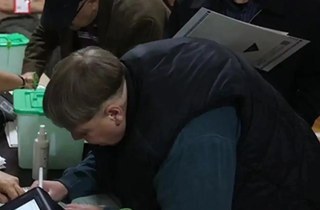The pivotal election has drawn intense scrutiny as it could shape Georgia’s future path toward European Union (EU) integration.
However, a coalition of pro-western opposition parties, which has also declared victory, claims it has garnered a collective majority. This sets the stage for potential confrontations between GD and opposition forces over the country's pro-EU aspirations. The opposition argues that the Georgian public has voiced a clear desire for deeper EU integration, an objective complicated by the ruling party’s perceived pivot toward Russia.
The election outcome is considered the most consequential since Georgia’s independence from the Soviet Union in 1991. Since 2012, GD has guided the country on a conservative course, moving away from the West and strengthening ties with Moscow. GD founder and influential billionaire Bidzina Ivanishvili celebrated the preliminary results, asserting that the success reflects the resilience of the Georgian people. "It is a rare case in the world that the same party achieves such success in such a difficult situation," Ivanishvili said.
In contrast, pro-opposition exit polls from channels like Formula and Mtavari Arkhi suggest that a coalition of opposition parties could secure a majority in Georgia’s 150-seat parliament. Rival exit polls, including one from GD-supporting Imedi TV, predict a 56% majority for GD. Tinatin Bokuchava, leader of the largest opposition party, United National Movement (UNM), emphasized the public’s pro-European stance, urging GD to concede.
For nearly three decades, the Georgian public has overwhelmingly supported EU membership, with recent polls indicating 80% in favor. GD’s stance on EU membership, however, has wavered, as the party has shown reluctance to criticize Moscow, even amid Russia's invasion of Ukraine. This position has raised concerns among those who see Georgia’s pro-western aspirations as jeopardized.
The pro-western opposition, a rare coalition of four blocs led by UNM, seeks to form a government aimed at redirecting Georgia toward EU integration. The opposition bloc’s coalition includes the Coalition for Change, comprising parties led by former UNM members, and has expressed commitment to oust GD from power. UNM was founded by former President Mikheil Saakashvili, currently imprisoned on charges his allies claim are politically motivated.
GD’s campaign centered on accusations that pro-western parties could entangle Georgia in conflict with Russia, citing the country’s brief 2008 war with Russia as a cautionary tale. Critics of GD also claim that the party harbors authoritarian ambitions, pointing to Ivanishvili’s pledge to ban key opposition parties if re-elected.
As international attention turns to Georgia, Brussels has highlighted this election as critical to Georgia’s EU prospects. Meanwhile, Moscow is watching closely, as Georgia’s path forward holds broader regional implications amid tensions with Russia. (ILKHA)



 Dünya
Dünya
 Güncel
Güncel
 Güncel
Güncel
 Güncel
Güncel
 Güncel
Güncel
 Dünya
Dünya
 Güncel
Güncel
 Güncel
Güncel
 Sağlık
Sağlık
 Güncel
Güncel





